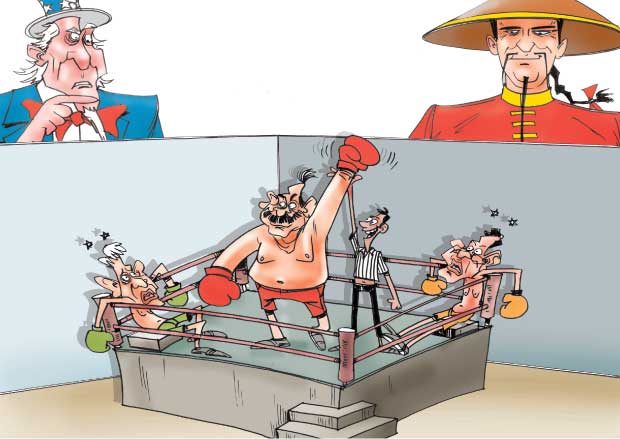Reply To:
Name - Reply Comment

Bitterness between the United National Party (UNP) and the Sri Lanka Freedom Party (SLFP) that raged in the run up to the local authorities’ elections has now taken a turn for the worse in the aftermath of the shocking electoral defeat at last Saturday’s polls.
 The electoral defeat, a blow to the national unity government formed between the two, created further ripples in the government. So to speak, President Maithripala Sirisena, who criticized the UNP during the elections, took yet another major swipe at it at a meeting with the Cabinet Ministers including Prime Minister Ranil Wickremesinghe on Tuesday evening. The President bemoaned that the UNP disregarded him in the discharge of governmental duties, and did not even do what he suggested. In fact, the President cited it as the reason for the current predicament facing the government.
The electoral defeat, a blow to the national unity government formed between the two, created further ripples in the government. So to speak, President Maithripala Sirisena, who criticized the UNP during the elections, took yet another major swipe at it at a meeting with the Cabinet Ministers including Prime Minister Ranil Wickremesinghe on Tuesday evening. The President bemoaned that the UNP disregarded him in the discharge of governmental duties, and did not even do what he suggested. In fact, the President cited it as the reason for the current predicament facing the government.
All in all, the President strictly maintained his position that the Prime Minister should step down making the way for another to form a government. Yet, the President’s suggestion was met with stiff resistance by the UNP Ministers who insisted that the Prime Minister should remain for the rest of the term.
The UNP Ministers, including the leaders of the political parties aligned with the UNP to form the United National Front (UNF), had resolved that the UNP leader should be the Prime Minister. In fact, they opined that only the UNP and the UNF should decide on their leadership and not the President or his SLFP.
This is slated to create a new gridlock in the state of affairs. The President is adamant in his position that the Prime Minister should relinquish his office whereas a bulk of the UNP MPs do not favour such a move at this hour.
Today, these international players are a disillusioned lot because their favorite political leadership of Sri Lanka is rejected by people at large. Yet, they are not ready to let go of the situation. According to political sources, US Ambassador Atul Keshap and Indian High Commissioner Taranjith Singh Sandh u called on President Sirisena after the election and requested the President not to pursue action for the replacement of the premier
In this instance, one cannot disregard the fundamental political realities that came into being after the enactment of the 19th Amendment incorporated into the Constitution under the new government in 2015. The President cannot change Cabinet portfolios without consulting the Prime Minister. Though the President is the appointing authority, it has to be done in consultation with the Prime Minister. In fact, it is a mandatory  requirement. That is why the President asked the Prime Minister to step down. Otherwise, he cannot remove him. As such, the 19th Amendment, seen as the baby produced by the unity government, now stands on the way of the President to act on his own. Obviously, the President would not have expected the 19th Amendment to work in that way. However, he might be exploring ways as get over these limitations as well and exercise his executive writ.
requirement. That is why the President asked the Prime Minister to step down. Otherwise, he cannot remove him. As such, the 19th Amendment, seen as the baby produced by the unity government, now stands on the way of the President to act on his own. Obviously, the President would not have expected the 19th Amendment to work in that way. However, he might be exploring ways as get over these limitations as well and exercise his executive writ.
Also, it is impossible for the President to dissolve Parliament before the lapse of for four and half years. If it is to be dissolved, it has to done through a resolution passed by the House with a majority of two-thirds. It is not that easy to garner a two-thirds for such a resolution, realistically speaking. The parliamentarians, specially the first- timers, would naturally love to serve their full term so that they are entitled to benefits such as a pension. Premature dissolution will deprive them of such benefits. Likewise, those who are unlikely to get re-elected next time, will not prefer early dissolution of the House. So, by all means and all accounts, it is an uphill task though nothing can be ruled out in politics under the current circumstances.
Be that as it may, the current political circumstances have thrown the government into a real gridlock. It was undoubtedly brought about by the humiliating electoral defeat at the local polls. The elections, though meant for the selection of representatives to govern the local bodies, assumed national significance and, in fact, served virtually as a referendum that offered people the opportunity to give their verdict on the performance of the government during the last three years.
The Prime Minister is facing the axe not only from the SLFP led by the President but also from some within his own party. Mr. Wickremesinghe has been the leader of the UNP since 1994. From time to time, he successfully stood up to the revolts from within the party against his leadership.
At the same time the two parties will be compelled to run the government for two more years till the next general election weathering all political discomforts. Nonetheless, it is likely to happen with some changes. Against this backdrop, talks are now underway to change the structure of the government or to appoint a new Prime Minister. The Ministers, representing the SLFP, propose Speaker Karu Jayasuriya to the post. Otherwise, they even threatened to quit the government and sit in the opposition.
The President has taken a tough position that the Prime Minister should resign forthwith. It is unlikely that the UNP will back the President in this instance. The President has also run short of options other than falling in line with the UNP at some point. Or else he would have to pull out a political surprise within the next couple of days.
EU, India , US wants unity Govt. to remain
It is common knowledge that the national unity government was installed with the blessings of a section of the international community. India and the United States played a pivotal role in this exercise. At the 2015 Presidential Election, India played its role mainly by ensuring the support of some Tamil political parties to Maithripala Sirisena as the common candidate. The US also played its role. The European Union also backed the move.
Today, these international players are a disillusioned lot because their favorite political leadership of Sri Lanka is rejected by people at large. Yet, they are not ready to let go of the situation. According to political sources, US Ambassador Atul Keshap and Indian High Commissioner Taranjith Singh Sandu called on President Sirisena after the election and requested the President not to pursue action for the replacement of the premier.
It is learnt from reliable sources that the European Union, like India and the US, prefers the status quo to remain.
PM again faces challenges against his party leadership
The election results led the government to be entangled in confusions and contradictions. It is difficult to unshackle the government from the web of creepers it is enmeshed in.
The Prime Minister is facing the axe not only from the SLFP led by the President but also from some within his own party. Mr. Wickremesinghe has been the leader of the UNP since 1994. From time to time, he successfully stood up to the revolts from within the party against his leadership.
The call for a change of the UNP leadership has again been renewed. This time, Deputy Minister Harsha de Silva and State Minister of Foreign Affairs Wasantha Senanayake are reported to have made such remarks asking for an overall reform of the party’ s structure.
Alongside, at the UNP group meeting on Tuesday, State Minister Sujeewa Senasinghe and Deputy Minister Ajith P. Perera rapped the party hierarchy and pressed for far reaching reforms as well.
Rauff Hakeem, Marapana see Govt losing Sinhala Buddhist appeal
Meanwhile, Leader of Sri Lanka Muslim Congress (SLMC) Minister Rauff Hakeem opinioned at a meeting that the government was perceived as an anti-Sinhala Buddhist force, and the majority community had a feeling of insecurity. He viewed it as a reason for the people’s resounding rejection of the government this time.
Alongside, Foreign Affairs Minister Tilak Marapana had also raised similar concerns and said some actions of the government eroded the people’s confidence in the government in a major way.
Champika Ranawaka calls for far reaching reforms in Govt. and UNP
Megapolis and Western Province Development Minister Patali Champika Ranawaka is also among those insisting on extensive political reforms to the government and radical changes to the structure of the UNP at this time.
SLPP to beef up efforts to dissolve Parliament
The Sri Lanka Podujana Peramuna(SLPP), buoyed by the electoral victory, pushes for the premature dissolution of Parliament so that it can seek a fresh mandate from people to govern the country .
The leaders of the political parties aligned with the SLPP had a discussion in this regard. They assigned MPs Vasudeva Nanayakkara and SLPP Chairman Prof. G.L. Peiris to look at the modalities to secure the dissolution of Parliament through a resolution.
Speaker post offered to SLPP
SLPP has the support of 52 MPs in the House, who work under the banner of the Joint Opposition. In case of a change of government under the current Parliament, it is learnt that the Speaker post has been offered to someone from this group. The Joint Opposition is also not averse to the idea.
The Joint Opposition believes such a post will be vital to them at this hour rather than accepting any post in the government.
After yesterday’s Cabinet meeting, the UNP Ministers and MPs were invited for a luncheon discussion at Temple Trees. The Prime Minister addressed the meeting and decided to appoint a committee to decide on the future structure of the government. Alongside, the SLFP Ministers were supposed to meet with the President for a similar discussion. It has become apparent that some SLFPers will quit the government. The SLFP leadership will wait for their departure. A committee, to be appointed by the party, will work out recommendations to sustain the government for the next two years.
Sajith asks for restoration of fertilizer subsidy, free uniform materials
At the UNP meeting, Housing Construction and Engineering Services Minister Sajith Premadasa criticized the party policies. He proposed to re-introduce the former policy to issue fertilizer at Rs.350 a bag. Also, he said school uniform material should be distributed instead of vouchers for students to buy them in the open market.
The UNPers seem to be at a loss to understand the reasons for their failure at the elections. Some view the loss of Sinhala Buddhist appeal as the reason while others see the curtailment of subsidies as the factor that caused the defeat.
However, even the non-Sinhala-Buddhist leaders have been able to understand that the erosion of confidence among the majority community as a main cause for the electoral setback.
Deputy Minister Ajith P. Perera, even at this meeting yesterday, stressed that urgent actions were needed to rejuvenate the party as otherwise he, along with his colleagues, was not in a position to go back to their villages for interaction with people. He said the mere appointment of committees would not serve the purpose.
“If we delay the process, we will get defeated at the next elections,” he said.
Towards the tail end of the meeting, the Prime Minister left the meeting place inviting all others for lunch with him.
However, the UNP MPs, restless for reforms, surrounded Ministers Mangala Samaraweera and Malik Samarawickrama and aired their grievances.
In the meantime, the political forces, aligned with the UNP, are also distraught over the current developments. Leader of the Tamil Progressive Party Mano Ganeshan said he would revitalize his party in his way rather than counting on the UNP.
As these developments take place, It remains to be seen how the President and the government would navigate through the current stormy seas and see that stability is restored to at least carry out the basic governance of the country.